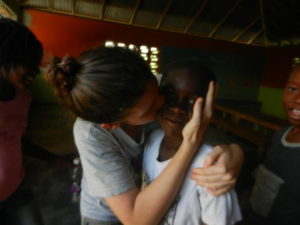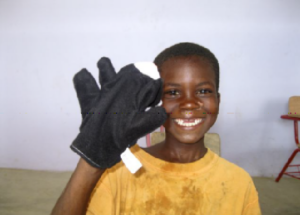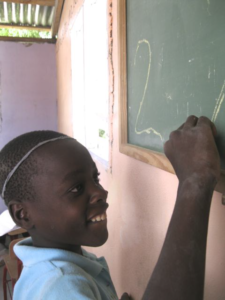My name is Annie Norris and I’ve spent the past 5 months as an Intern for JRF. During my time in Esperanza, I taught mathematics and literacy to 14 different students, supervised meal and playtime for 109 children and young adults, lived in 4 different houses, and ate only 11 different types of meals.
I taught, Yunior, an ~8 year old boy whose wide eyes communicated before any other part of his face, how to read. I taught Fanel, a ~10 year old boy who greeted me every morning as if he hadn’t seen me in years, how to work at his desk for 20 uninterrupted minutes. I taught Luis Miguel, a ~9 year old boy who mastered the curve of the number “2” while holding his nose one inch from his notebook, how to count up to 6. I taught Tony, a miniature ~7 year old boy with a ninja-like reflexes, how to master vowels. I taught Yenkle, a ~12 year old boy whose grin never left his friendly face, how to differentiate between numbers 6 and 7.
Guided by Director Catherine Serrano, my time in the classroom yielded tangible progress for JRF’s most academically delayed and behaviorally challenged students. Alexander is a ~6 year old boy who conquered numbers 1 through 10. Fourth in line from a family of 8, Alexander may be JRF’s most troubled child. After suspension due to bad behavior one afternoon, Alexander refused to leave the front entrance of the Foundation. Then, Alexander interrupted JRF’s daily after school prayer with his shouts echoing through a cinderblock cutout window. I went outside to quiet him down but was met with fistfuls of rocks and a mouthful of teeth vying for my forearms. While attempting to control his unpredictable movements on the dusty street, biting ants climbed over my flip-flops and crept up my exposed legs. Though his moods are as variable as Michigan’s weather, his cheeks still double in size when someone extracts a smile from them. In an effort to lure one of those smiles, I taught Alexander how to count from 1 to 6 by dancing a waltz. His thin little arm hung around my hip while my too-long arm reached down his side. Alexander’s first language of Haitian Creole made the pronunciation of Spanish numbers uncomfortable at first, but he mastered the skill with many dance practices.
Lula is a ~8 year old boy who vanquished the hundreds chart and the concept of place value. In our first 3 months together, Lula cried at least 3 days a week. His voice never rose above a whisper. While his thin frame bulged with muscles earned during yardwork, he had yet to comprehend the concept of tough academic work. To quell his tears, I would crouch next to him, rub his back, whisper encouragement, and sing songs. When he resisted every new concept by folding his arms over his head in a padlock tight seal, each rare smile that escaped his lips was a triumph. Any low decibel laugh was a victory. I taught Lula not only how to persevere, but also how to understand that academic success was possibility for him. His future is no longer limited to manual labor.
Catherine and David are the reason I met these children, spent every weekday with them, and positively affected their lives. Without Catherine and David constantly fighting against never-ending waves of difficulties, those 6 boys and the entire student population would not have hope. Even when, as ee cummings writes, some absurdities and blunders creep in, Catherine and David show up every day. Their confidence allows them to navigate toddler and teenage meltdowns—over and over again—and confront adults asking for aid. The supportive and safe community they have created allows students starved for love and attention to receive it and children forgotten by society to be remembered.
My choice to pursue an occupation different from teaching was an agonizing one. Emily Dickinson was right; parting is all we need to know of hell. Yet, I look forward to continuing to support Catherine, David, and staff in their daring adventure: saving the lives of street children and making the kids’ future brighter through the Joan Rose Foundation.





